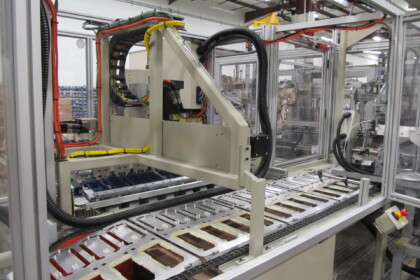
Projects & Materials

Teacher-in-Residence Program builds partnerships in STEM education

Curriculum units developed through public-private partnerships make STEM learning relevant
The Cape Cod Regional STEM Network’s Teacher-in-Residence Program pairs Pre-K–12 teachers with STEM-rich organizations across the region to explore STEM beyond the classroom. In its fifth year this past summer, the program sent 19 teachers into these impressively STEM-rich settings:
- Atlantic White Shark Conservancy
- Cape Cod Museum of Natural History
- Chatham Marconi Maritime Center
- Marine Biological Laboratory
- NOAA Stellwagen Bank National Marine Sanctuary
- National Marine Life Center
- Ocean Protection Advocacy Kids
- Pleasant Bay Community Boating
- SencorpWhite
- Smithers
- Teledyne Marine Systems
- Whydah Pirate Museum
- Woods Hole Oceanographic Institution
- Woods Hole Sea Grant
Each teacher’s two week-long residency is built around the challenge of creating a project in collaboration with staff at the host institution. The goal is to develop approaches and STEM curricular materials that engage young people in STEM in the real world—at host sites such as museums, research institutions, or businesses—and are relevant back at school, too.
Teachers developed curriculum materials and gained insights on their teaching, too.
Siobhan Curran, who teaches 11th grade at MA Academy of Math and Science, went into her residency at Teledyne Marine Systems worried about how hard it had been for some of her students to grasp the engineering process.
During her externship, watching Bob Melvin, Vice President of Engineering at Teledyne, conduct knowledge gap analysis with his engineers was a revelation. The experience gave her new tools for helping students try out an engineering mindset.
“Now my students say that fishbone diagrams are one of the most useful brainstorming techniques they know."
Adopting methods that real engineers use has put her students more at ease with her lessons.
“The impact,” she says, “has been tremendous.”
Siobhan repeated the externship program in Summer 2018 with a new company in Wareham: Smithers, and developed curriculum to teach Best Lab Practices, a current industry standard, adapted to high school students.
According to our site partners, the impact is just as important at their organizations.
This was our first year of collaboration with Sencorp White, the advanced manufacturing facility located in Hyannis. Keith Morrison, Vice President of Operations at the company told us he wondered if the program would be worth it.
“I was worried that the teacher wouldn’t be able to engage in the short two week period,” he says. “And that my employees wouldn’t embrace the process and it would take up too much of my time.”
But Keith gave the two teachers access to every part of the organization, and saw that they took full advantage of the opportunity.
“I’m not afraid to admit I was wrong,” he says.
Now the company has an enhanced program for engaging students during visits—something Keith sees as essential to recruiting young people into the field. And his staff shaped new manufacturing-oriented engineering activities for the teachers to take back to their classrooms.
STEM Curriculum Units
Several STEM-related curriculum units were developed as a result of this program, which are being updated and will be posted in the "Resources" tab of this page, as well as the STEM at School page.
Our goal is to continue the Teacher-in-Residence Program in Summer 2025. Through a grant from the Woods Hole Sea Grant in Summer 2021 we expanded our efforts to support diversity in STEM by supporting teachers from underrepresented groups in STEM (Women, Black, Indigenous, People of Color), or those teaching students primarily from underrepresented populations.
The Teacher-in-Residence program was funded by National Science Foundation grant #1347610. Any opinions, findings, and conclusions or recommendations expressed are those of the author and do not necessarily reflect the views of the National Science Foundation.
For more information, contact Paul Reibach, Director, Cape Cod STEM Network at director@capecodstemnetwork.org.